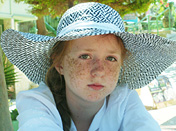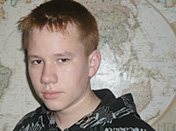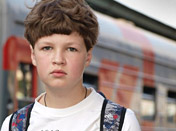
Sometimes we hear people say: “I can’t read this book—it’s too heavy.”
A heavy read is not a precise term, it’s an image. We have a clear sense of what it means: the book describes events or experiences that force the reader into an unbearable, difficult state. Its literary form—and literature always edits reality to some degree—doesn’t help the reader overcome the weight of the subject matter.
So do teenagers have books they consider too heavy? Do they differentiate between scary books and heavy books? We posed these questions to our “Reading Expert of the XXI Century” contest winners and Papmambook’s regular teenage contributors.

Alexandra Dvoretskaya, 12
Heavy books, to me, are not just “blood and guts.”
Horror, with its pools of blood and corpses piling up, is more of a tease for the nerves, but it doesn’t make for a “heavy” book. I have a book of horror stories, bought for twenty rubles at the nearest kiosk. I’ll admit I tore into the book and kept myself entertained for a whole half hour. I remember that I really enjoyed the book at the time. Having turned the last page, I set it aside. And I never thought of it again. It made no impression on my soul. I don’t even remember the plot.
But there are books about war. Those are truly heavy. You read it once, and you never forget it. That weighed-down feeling stays in your heart. War is something I don’t know and have no desire to know of. But you have to. Every year, when May 9 May 9 is celebrated as WWII Victory Day in Russia. comes around, I pick up another book about the war. Not because I want to, but because you have to. I’m happy to live in a peaceful time and I don’t like to think about the horrors of war. But I know we have to remember it.
There are “heavy” books that I do like. One is The Book Thief by Markus Zusak. It’s heavy. It’s magical. It sucks you in. You want to re-read it over and over. It’s impossible to forget. The book excites incredibly deep feelings. Same with movies—Hachi: A Dog’s Tale, for example. I never get tired of watching it. Such heavy things just draw you in.


Daria Ponomareva, 14
Heavy psychological works like Stefan Casta’s The Green Circle, Yulia Lavryashina’s Snail on a Plate, or Barbara Sher‘s self-help books are attractive in that they present situations that reflect real life. And who can resist a peek at how other people found resolutions to their problems? You have to let such works go through you—and that’s the heavy part. These books teach you to listen and feel. They truly enlighten the reader.


Bogdan Ivanov, 14
I suppose there aren’t any books I’d consider “heavy.” Whatever horrors or atrocities, misfortunes or catastrophes occur, it’s not hard for me, psychologically, to read and process it. For example, Memoirs of the Sansons didn’t shock me with its conveyor belt of executions. I felt bad for the people. But that didn’t make it hard for me to read the book and it didn’t leave me with any deep trauma. When my mom decided to read it, however, it was really hard for her, because book’s depiction of the horrors of the revolution really weighed on her psychologically.
Maybe I just haven’t encountered that book that would truly impress me. For the moment, there are no books I would consider “heavy.”


Sofia Larkina, 14
I think “heavy” books are those that are written in a heavy style. For example with difficult language where there’s a lot of everything and you can’t latch on to anything, you get tangled in words. Nabokov is an example of that—he writes in a very heavy style. It was also hard for me to read Victor Hugo’s Les Misérables because the author seems to be fooling you and trying to cover up his lie with words. In general, it’s hard to read a book when you don’t trust the author for some reason. Or if you feel the author doesn’t seem to believe himself. Or if the author suddenly sees you, though he’s not supposed to know you’re there, and doesn’t forgive you. I’m afraid of Nikolai Gogol. After his story The Portrait, it was really rough. Truly horrifying. Actually, everything frightening that’s in me is what’s really frightening and heavy. The author’s harsh words are hard to take too, like when your parents reprimand you, and you are actually guilty. That is, if I read a book and suddenly sense that I’m afraid of myself and people in general—it’s probably a heavy book.


Grigory Volkov, 14
Of course, there are “heavy” books out there. These are books that leave you with a dark or gloomy aftertaste. I’m not about to stop reading a book if I somehow learn that it’s “heavy.” That, after all, is another person’s opinion, and different people have completely different impressions. If one person might have nightmares after reading a book, another might not experience anything at all. For example, let’s take three books people consider heavy: Dostoevsky’s Crime and Punishment, Solzhenitsyn’s One Day in the Life of Ivan Denisovich, and Zusak’s The Book Thief. I don’t find them heavy at all. Another example is Lord of the Flies by William Golding, which everyone thinks is a heavy read. It was when things got really dark that I found it easiest to read, and I finished it before bed without suffering any consequences.
Of course a heavy read might attract readers the way horror films or dark music attracts some people. But I can’t judge how this literature might be appealing since I don’t personally read a book to experience terror. I’ve certainly come across heavy books but I don’t remember any specific ones—that terror somehow dissipates after reading. I can’t recall any.


Evgenia Shelkonogova, 13
I never thought I’d one day be asked what I think about heavy books. The only truly heavy topic for me is World War II. At the same time, it’s always been a given for me that though these books aren’t easy to read, they’re absolutely necessary. If not for books to remind us of the tragedies of the past, what can save humanity from repeating our history in the future?
To be completely honest, I’ll admit I don’t read books about war except for those assigned in school. I’m really impressionable and reading books on that topic usually ends up giving me obsessive awful thoughts that are almost impossible to get rid of.
Sadly, that impressionability makes it difficult for me to read many wonderful books. How do I know? There’s one book about war that I read not for school but because my mom talked me into it. It’s Eric-Emmanuel Schmitt’s story “The Dog.”
Why did I pick up that book? I didn’t read the blurb and didn’t know what it was about and since there weren’t any other books around at the moment, I started reading. It was the story of a Jewish boy in a concentration camp. What could be more tragic?
This book made a very strong impression on me, but it wasn’t a heavy or oppressive one. I was in awe of the main characters. This book is an ode to the strongest friendship that exists—the friendship between a dog and a human. As an animal lover and a happy owner of a little spaniel, I was smitten.
Still, the description of the war’s horrors—not even the description, just their mention—brought about those same dark thoughts because of my sensitivity.
I read the novella last summer and haven’t opened the book since. I consider the story genius, I’ll admit it’s one of Schmitt’s best works, but I can’t find it in me to re-read it.
It’s a shame I can’t make myself read books about war. Maybe one day I’ll overcome my fear of the nightmares that take over after reading. I hope that respect for the heroes of WWII will help me do so.


Varvara Petrova, 12
Yes, there are books I find heavy. I think those works are interesting—they help you see a different life: the life of the slave from Uncle Tom’s Cabin, the lives of children with disabilities from Wonder and Out of My Mind, the struggles to survive in books about the blockade in Leningrad in World War II.
When I tried to define a “heavy” book for myself, the definition seemed to slip away and everything came down to “I won’t read it.” In the end I decided to write about the possible reasons for not wanting to read heavy books.
Once, my mom complained to me that one of her friends said, in response to a book recommendation: “I won’t read it. Life is gloomy enough as it is and I read books to get away from the awfulness of everyday life.” My mom was indignant and I was too. But now I think: why not? In Daniel Pennac’s The Rights of a Reader, it says, without a hint of hostility, that a reader can read “anything” and that it’s his choice what to read. A choice that should be respected. The desires to entertain yourself, distract yourself, or relax are all completely valid.
The second reason one may avoid “heavy” books is that others may argue that you’re not ready for them emotionally. That almost happened to me. I didn’t cry over Hachiko or Tom. So I was criticized: “Why are you so heartless and unsentimental? Don’t you feel bad for the character?” That was unpleasant. You feel like something’s wrong with you, that you’re made of stone. And you think: “Maybe that’s enough of these heavy books, films, plays? I’ll watch and read comedies and nobody will accuse me of being heartless.” But it doesn’t quite work out that way—that’s not the genre I’m drawn to.
Heavy books have many virtues. First, you learn about another life, which is completely different from your “happy” one. Second, reading a heavy book is a valuable experience in getting over yourself, that sense of feeling that you and the character and their struggles are one. Third, a heavy book touches many readers, awakens new emotions—initiates you along with other readers. Fourth, difficult reading implies that you’re doing a lot of thinking. And finally, reading about heavy themes makes you see the positives in your own life.
I would say reading a heavy book first and foremost exposes you to a different life experience. Despite all the horror, you should really try to read books about the blockade. Some adults will probably force those books on a teenager to say “look at you buying another iPhone, children didn’t even have bread to eat during the war, but they lived and tried to be happy.” But I think that final point about being grateful is more of a bonus, and that awkward attempt to “use” the books shouldn’t push you away from the book itself.
Anyone who reads books about the blockade (or any heavy reading for that matter), is also a hero in a way. True, he wasn’t in Leningrad in 1942, but he did spend the time with the character. And that’s a little victory of his own...


Ivan Dyomin, 10
There are no books I would consider “heavy,” though I suppose it means something frightening or emotional. Lord of the Flies was not as heavy a book as people said it would be. I thought it was a work that you could call scary but the idea of heavy doesn’t quite fit.
I don’t think such stories can be attractive to readers.
I’ve encountered such book—Dmitriy Grigorovich’s Gutta-percha Boy, for example, where they kill first the puppy and then the main character.


Anna Klykova, 11
There are books on heavy topics and there are books that leave you with a heaviness in your heart.
I’m not afraid of books on difficult topics and I rarely set them aside. It all depends on my inner state. When I’m down and feeling like I’m in a hopeless situation, those are the books I reach for first. When I start to read them I understand that everything in those books is much worse than it is for me, and that I can overcome my situation. Other times, I just want to learn more about the topic.
But I suppose the question is about books that leave an aftertaste. Of those I’ve read so far, there were probably two that fit the bill.
The first was Gavriil Troyepolsky’s White Bim Black Ear. I’m the kind of person that can’t stand a dog’s death. I feel sick if I see it or read about it and I get dizzy, can’t breathe. My vision clouds over and my heart starts to hurt. It’s as though I’m dying with the animal. After Troyepolsky’s book I couldn’t sleep and kept crying and crying. Throughout the whole book I rooted for Bim and believed that everything would end well. I still can’t accept that the author killed Bim. Even Ivan Turgenev’s Mumu was easier to take. Maybe because in Turgenev’s work the dog wasn’t the main character. But Gerasim drowning the dog doesn’t sit well with me. I can’t understand and forgive him.
The second book that made left a heavy feeling in me was The Boy in the Striped Pajamas. I’ve read many books about that war and sympathized with the protagonists, but this book is something else. It destroyed all my ideas about how things were. It’s like the picture went from black-and-white to color. I felt how it all happened. That the extermination of people was a normal, everyday thing—I found that unbearable.
I won’t be rereading those books. I’m afraid something inside me will break.
I would call a heavy book one that leaves a sense of hopelessness.
Can books like that attract readers? Not me, that’s for sure, but I can’t speak for others. I’m more partial to books where the author doesn’t relish the hopelessness, doesn’t play with my feelings but instead shares his pain with me, without transmitting it.


Evgeny Zherbin, 12
Sometimes, when you read a book (or it falls on your foot), you realize it’s a heavy one. That you just can’t read it. That usually happens for one of several reasons.
One. The book is written on some topic that you find unpleasant (torture, killings, darkness, grisliness, hopelessness. Those things don’t scare me personally. To the contrary.)
Two. The topic is simply uninteresting to me, like books about animals.
Three. The book is written in a complex literary style. (I, for one, can’t handle Russian classics.)
Four. The book is simply boring, strange, and uninteresting.
And sometimes you just open a book and just know exactly why you won’t read it. Justbecause.


Ksenia Barysheva, 12
Sometimes it really is difficult to read. What most often hampers reading and grates on you is the style, the author’s voice. Sometimes, I read a few paragraphs and put the book back on the shelf—I don’t feel like sorting through the author’s convoluted sentences and thoughts. Of course, the feelings that the author wants to get across are sometimes so strong that as you read you don’t notice the unevenness of the writing, the dense language, the sentence fragments. That’s what happened with Evgeny Rudashevsky’s Hello, Brother Bzou. When I started reading I felt like the author didn’t let one thought fully complete itself before he begins another. But his love for the characters and respect for the land where they grew up just swept me away. By the second page I no longer noticed what had bothered me so much on the first.
The opposite can happen, too. Once, drawn in by the rave reviews, I made off with my mom’s copy of Donna Tart’s The Goldfinch, which starts with thirteen-year old Theo Decker going to a gallery with his mother and witnessing a terrorist attack. A bomb goes off, but the boy survives and unconsciously hides Fabritius’s painting The Goldfinch under his coat. He runs home and waits for his mom, who will never come home. I sat in the room by myself and felt like the book’s protagonist, who can’t yet comprehend what has happened: he’s dazed, scared, at a loss. But I didn’t get the rest of the book. In spite of Donna Tartt's literary gifts, I couldn’t finish the book. I got stuck in the endless descriptions, the unnecessary details of the plot and kept rereading the same parts without understanding what she meant to say. Maybe it was too early for me to read The Goldfinch.
But these are superficial reasons. The most difficult reasons for struggling to read a book aren’t about the text, plot, or the author’s mastery. They are hard to explain logically because they are deep within each reader—her acquired emotional experience. Sometimes when I read I have an inexplicable inner resistance to the author’s will, like I don’t want to accept what I’m reading with all my being. The hardest book I’ve ever read, which I’d set aside several times, then picked up only to put it back on the shelf, unable to read further, was Chinghiz Aitmatov’s The White Ship. Even though the book is written with smooth, poetic language and has so many unbelievably precise observations and nuances, I just couldn’t read further. Just like any normal person can’t watch a kitten being drowned or a dog tied out of reach from its water bowl. It’s hard to enjoy the beautiful language when the author describes what he does: how Orozkul beats his wife Bekey, how Momun sees his daughter Bekey’s unhappiness every day but can’t help her, how Orozkul hates Momun’s grandson, a child that remains unnamed in the book. The author leaves no hope for a happy ending. The boy dies but his death doesn’t save anyone and teaches no one. The most horrifying is that parts of the mosaic that comprise The White Ship are recognizable from everyday life; you recognize the characters but can’t do anything. This truth, which you prefer not to see or accept in real life, jumps out mercilessly from the pages.
It can certainly be hard to read about death, though death is just a part of life, like birth. Martyrs’ death for their faith inspired heroic deeds, warriors’ deaths for their country’s freedom gave others courage. The death of Amza, the protagonist of Hello, Brother Bzou makes us think about the meaninglessness of a foreign war, war on a foreign land, for foreign interests, and changes the reader’s perspective.
The death of the boy in The White Ship doesn’t change anything. The inner resistance to that ending forces you to set aside the book again and again. Orozkul will go on drinking, beating his wife and reveling in his power. Momun will look on, just the same, without a word. His wife, the old lady, will still grumble, persuading him not to argue with authority.
When I was younger, I often rewrote the ends of books. In my endings, despite the fictional truth, Bim happily throws himself to the feet of Ivan Ivanovich, who was all better, the Little Mermaid suddenly comes back to life, and the kindly postman does deliver the letter to Grandpa Konstantin Makarych [from Anton Chekhov’s story Vanka].
But if it can be so hard to read sometimes, why bother to read at all? Shouldn’t literature teach you something, or like any work of art, bring aesthetic delight? Why torture yourself reading The White Ship?
I think reading gives us that experience of the soul which allows us to make the right choice in real life. The boy dies because he doesn’t know how to live on when his world is completely destroyed, when all he believes in is cursed and stamped out, when he has nowhere else to go. But that knowledge comes to those who get to the last page of the book. You can’t enjoy the book but you can pour it into yourself drop by drop like a medicine in order to die with the boy and be reborn as a new person. As Friedrich Nietzsche said: “What doesn’t kill us makes us stronger.”
Translated from the Russian by Alisa Cherkasova
Cover picture: Flickr
Originally published in 2017
Follow us on Facebook.
